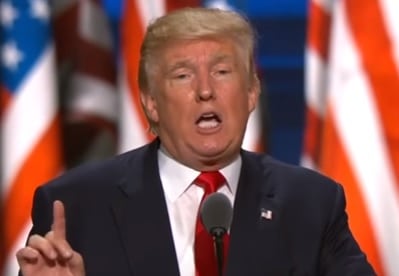
Donald Trump’s election as the 45th president of the United States almost certainly means massive changes in the U.S. environmental and climate policies put in place by President Barack Obama. On the potential chopping block are the Environmental Protection Agency’s Clean Power Plan and U.S. participation in the Paris Agreement on climate change.
The Republican defied polls and expectations to secure 276 electoral votes as of 9 a.m. Wednesday, six more than needed to win the presidency and well over Democrat Hillary Clinton’s 218. Both chambers of Congress also remained in GOP hands.
In an early morning victory speech, Trump delivered a message of unity after a long, divisive campaign, but avoided discussion of policy plans. “Now it’s time for America to bind the wounds of division; have to get together. To all Republicans and Democrats and independents across this nation, I say it is time for us to come together as one united people,” he told an audience of supporters in New York City.
The mood was far less optimistic among environmentalists. “Take care of each other, everyone. We’re going to need to be at our best starting tomorrow morning,” Sierra Club Director Michael Brune tweeted.
Trump’s energy plan calls for making the United States energy independent, focusing on fossil fuels including “hundreds of years of clean coal reserves.” In campaigning through coal country, he promised to reopen mines. His campaign website indicates Trump intends to end the moratorium on new coal leases on federal lands, which the Interior Department established in January while it conducts a programmatic environmental impact statement of the U.S. coal leasing program.
The billionaire has also pledged to undo Obama executives actions and regulations such as the Clean Power Plan, which requires states to develop action plans to meet federally set carbon emissions reductions targets. The rule has already faced intense opposition from Republican lawmakers, along with a federal lawsuit led by nearly 30 states.
“I propose a moratorium on new federal regulations that are not compelled by Congress or public safety, and I will eliminate all needless and job-killing now on the books – and there are plenty of them,” Trump said in a September campaign speech. “This includes eliminating some of our most intrusive regulations, like the Waters of the U.S. rule. It also means scrapping the EPA’s so-called Clean Power Plan, which the government itself estimates will cost $7.2 billion a year.”
The EPA has estimated the public health and climate benefits of the Clean Power Plan at $55 billion to $93 billion annually in 2030, compared to yearly costs of $7.3 billion to $8.8 billion.
Trump has repeatedly called climate change a hoax, suggesting at least once it is perpetrated by the Chinese. This puts him at odd with heads of state worldwide, according to the Sierra Club.
He has promised to “cancel” the Paris Agreement, which entered into force on Friday and includes commitments by nearly 200 nations to take steps to keep global temperature rise to well below 2 degrees Celsius. While the accord’s entry into force means all formal member nations — now over 100 — cannot withdraw for four years, there is no legally binding requirement that the United States actually make good on the Obama administration’s commitment to by 2025 reduce U.S. greenhouse gas emissions by 26-28 percent below 2005 levels.
The United States is the No. 2 emitter worldwide of greenhouse gases linked to climate change, behind China. Its ratification of the Paris Agreement in September, in a ceremony with China, was a major step toward the trigger needed to bring the accord into force — ratification by 55 nations representing at least 55 percent of global emissions.
If the United States backs off, other nations might do the same, experts have said.
“Not everyone is on board yet, things are still delicate, busy settling into place… there hasn’t been enough time for it to become irreversible,” Teresa Ribera, director of the Institute for Sustainable Development and International Relations in Paris, told Agence France-Presse just days before the election.
Delegates are currently meeting in Morocco for the 22nd session of the Conference of Parties (COP22) to the United Nations Framework Convention on Climate Change. A major focus of the event is advancing implementation of the Paris Agreement.
“There is no possible turning back in the negotiation on what was agreed in Paris … we can only advance,” said Salaheddine Mezouar, Moroccan foreign minister and president of COP22, said in a London Guardian article.